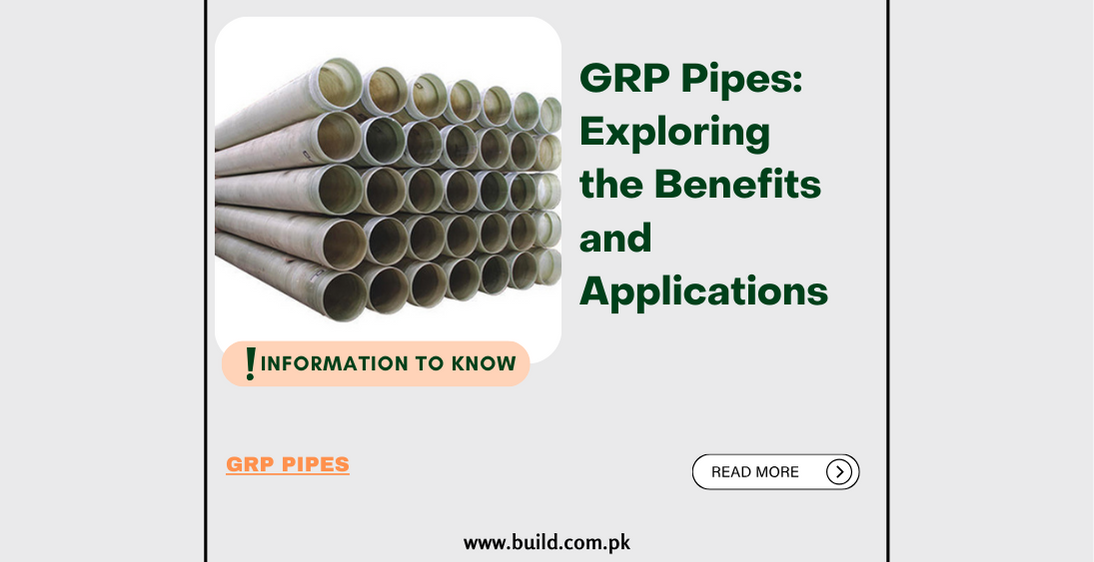GRP Pipes: Exploring the Benefits and Applications

Introduction:
In the realm of piping solutions, Glass
Reinforced Plastic (GRP) pipes have emerged as a versatile and durable option
for a wide range of applications. Engineered to withstand corrosive
environments, high pressures, and extreme temperatures, GRP pipes offer
numerous advantages over traditional piping materials. In this extensive guide,
we'll delve into the world of GRP pipes, exploring their construction,
benefits, applications and why they have become a preferred choice for
infrastructure projects around the globe.
Understanding GRP Pipes
GRP pipes, also known as
fiberglass-reinforced plastic pipes, are composite materials composed of glass
fibers embedded in a thermosetting resin matrix. This unique construction
combines the strength and durability of glass fibers with the corrosion
resistance and flexibility of plastic resin, resulting in a lightweight, yet
robust piping solution. Here are some key features of GRP pipes:
Corrosion Resistance:
One of the primary advantages of GRP
pipes is their exceptional resistance to corrosion, aking them ideal for
conveying corrosive fluids, chemicals, and wastewater in harsh environments
such as industrial plants, chemical processing facilities, and sewage treatment
plants.
High Strength-to-Weight Ratio:
Despite being lightweight, GRP
pipes exhibit high tensile strength and stiffness, allowing them to withstand
high internal pressures and external loads without deformation or failure. This
makes GRP pipes suitable for underground installations, buried pipelines, and
marine applications.
Chemical Resistance:
GRP pipes are inert to a wide range of
chemicals, acids, alkalis, and solvents, making them resistant to chemical
attack and degradation. This property ensures long-term durability and
reliability in aggressive chemical environments, reducing the need for
maintenance and replacement.
Smooth Internal Surface:
GRP pipes have a smooth, non-porous
internal surface that minimizes friction and resistance to fluid flow,
resulting in reduced energy consumption, improved hydraulic efficiency, and
lower pumping costs over the lifetime of the pipeline.

Exploring the Benefits of GRP Pipes
The unique properties of
GRP pipes offer numerous benefits for infrastructure projects, industrial applications,
and municipal utilities. Here are some key advantages of using GRP pipes:
Longevity and Durability:
GRP pipes have a proven track
record of long-term performance and durability, with a service life of up to 50
years or more when properly installed and maintained. Their resistance to
corrosion, chemical attack, and biological growth ensures reliable operation
and minimal downtime.
Lightweight and Easy to Install:
GRP pipes are lightweight
and easy to handle, transport, and install compared to traditional piping
materials such as steel, concrete, or ductile iron. This reduces installation
time, labor costs, and equipment requirements, making GRP pipes a
cost-effective choice for pipeline projects.
Reduced Maintenance Requirements:
Due to their corrosion
resistance and smooth internal surface, GRP pipes require minimal maintenance
over their service life. This translates to lower operating costs, reduced
downtime, and increased reliability for pipeline owners and operators.
Environmental Sustainability:
GRP pipes are eco-friendly
alternatives to traditional piping materials, as they are non-toxic, inert, and
recyclable. Their lightweight construction and long service life contribute to
energy savings, reduced carbon emissions, and sustainable nfrastructure
development.
Applications of GRP Pipes
Water and Wastewater Management: GRP pipes are used for water
supply networks, sewage and drainage systems, stormwater management, and
desalination plants.
Oil and Gas Industry: GRP pipes are employed for offshore oil
and gas pipelines, onshore oilfield gathering systems, and refinery piping
networks due to their corrosion resistance and durability.
Chemical Processing: GRP pipes are utilized for conveying
corrosive chemicals, acids, and solvents in chemical processing plants,
petrochemical refineries, and industrial manufacturing facilities.
Infrastructure Projects: GRP pipes are suitable for
infrastructure projects such as bridge drainage, culvert rehabilitation,
trenchless pipe relining, and water treatment facilities due to their
lightweight, durable, and corrosion-resistant properties.
Conclusion:
GRP pipes stand as a testament to innovation and excellence in the realm of piping solutions, offering unmatched durability, reliability, and performance for a wide range of applications. By understanding the construction, benefits, and applications of GRP pipes, engineers, contractors, and infrastructure developers can make informed decisions and choose the right piping solution for their projects. Whether used in water and wastewater management, oil and gas industry, chemical processing, or infrastructure projects, GRP pipes deliver superior results, making them the preferrd choice for demanding applications around the world. Choose GRP pipes for your next project and experience the difference in quality, reliability, and longevity that sets them apart from traditional piping materials.









